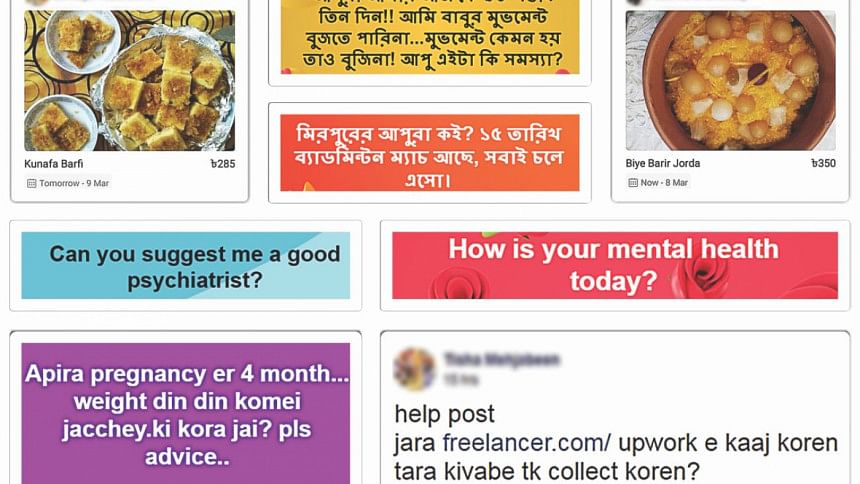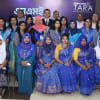Digitally hers

What does a woman need to get out of an abusive situation?
According to Namira Hossain, the co-founder and CEO of Cookups, an online platform for buying and selling homemade food, if women have self confidence and financial independence, they can walk out of any exploitative relationship.
Through the online platform Cookups, she and her team wanted to turn what is usually considered “unpaid work” for a homemaker into a means of earning, without the latter having to step out of the home. And in the process, gain financial independence to do as she chooses with her life.
“In our society, the mobility of women is often restricted. Sometimes their families refrain them from working outside. Women's day-to-day responsibilities such as child-rearing or taking care of their households—which always falls on women in our patriarchal society—also limit them from working outside the home. Through platforms like Cookups, they can showcase their talent and work from home,” said Namira.
If somebody wants to work with Cookups, they can sign up through the app. After that, the Cookups team visits the home to inspect the kitchen so that they can ensure that hygiene standards are being maintained. Once a kitchen passes the hygiene test, Cookups allows cooks to start advertising and selling food on the app.
Cookups currently has1400 cooks, 98 percent of whomare women.
One such cook is 48-year-old Romana Ali, who was awarded Cookups cook of the year 2018. Ali has been regularly working with Cookups for the past one and a half year. “I never had a formal job in my life, as I had to devote my time to take care of the family. But I had a passion for cooking and my friends would praise my skills, so I thought of getting on the platform. After I started selling in Cookups, I have been earning around Tk 40,000 per month,” said Romana Ali.
“It is such a nice feeling to get cash from selling the food you prepare. I never felt that I could contribute to the house rent and family expenditures at this age,” she added.
Along with earning money, women are also seeking refuge in female-only Facebook groups where they can support one another in everyday life. One such group is 'Shokti Network', which was formed in 2015 after the Pahela Baishakh sexual assault incidents at TSC to create a location-based friendship network that helps women explore places in a group and protect themselves from harassment.
“Initially, we wanted every girl to be connected with other girls of her neighbourhood and become friends,” said Nushrat Farhana, one of the administrators of the Shokti Network. “For example, the men of a specific area can befriend each other easily in an evening tea stall gathering or after Jummah prayers on Fridays. But women don't have that opportunity. They don't even know who is living in their opposite flat.”
Currently, the group has connected nearly 2,000 members from 13 areas of the city; in each area, they have a group coordinator.
To strengthen the network's impact beyond social media, members of specific areas occasionally meet offline. Debjani Modak, a content executive at a digital marketing agency, shares her experience about how she befriended other women in her area using the network. “I was very passionate about playing badminton but I couldn't do that as I did not have any female friends in my area. But I saw that the boys used to play badminton in front of my house every day. After joining Shokti Network, I got introduced to some of my 'elakar bon', and now we play badminton whenever we want,” said Debjani.
“I've learnt to ride bicycles from the Shokti cyclists, and often go on bike rides with them. I even met my best travel buddy, a mountaineer, from Shokti. We had several trips to Keokradong, Kaptai and Cox's Bazar,” she added.
In fact, there are many female-only Facebook groups which aim to solve different problems with the help of other women of same profession. For example, 'Female Only Freelancers of Bangladesh' is assisting a generation of emerging freelancers in navigating the world of outsourced work. Through this group, a large number of experienced freelancers are also getting gigs. The founder of the group is a female freelancer and currently it consists of 13,682 members.
According to Dilara Ireen Swarna, the founder of the group, experienced female freelancers help newcomers learn how to stay hopeful, and compete in the cutthroat world of freelancing. “The social responsibilities for men and women are not the same. Women need to maintain their personal and professional lives simultaneously. This group helps women learn how to divide their time efficiently,” she added.
The Facebook group 'Pregnancy Journey and Motherhood' is helping women tackle common problems faced by pregnant women and new mothers, such as, how to take care of themselves during pregnancy, what not to eat, how to take care of the babies, what home remedies to use, how to eradicate superstitions and misconceptions related to pregnancy and child-rearing and so on.
On the other hand, if a woman is going through problems related to her mental health, she can post in the Facebook group called 'Women for Each Other'. The group boasts trained supporters who help them by providing primary psycho-social support, such as counselling. If the women need any further help, they refer them to professionals and help them make appointments. The primary care they give is totally free of cost, while the follow-ups with trained mental health professionals are heavily discounted.

 For all latest news, follow The Daily Star's Google News channel.
For all latest news, follow The Daily Star's Google News channel. 








Comments